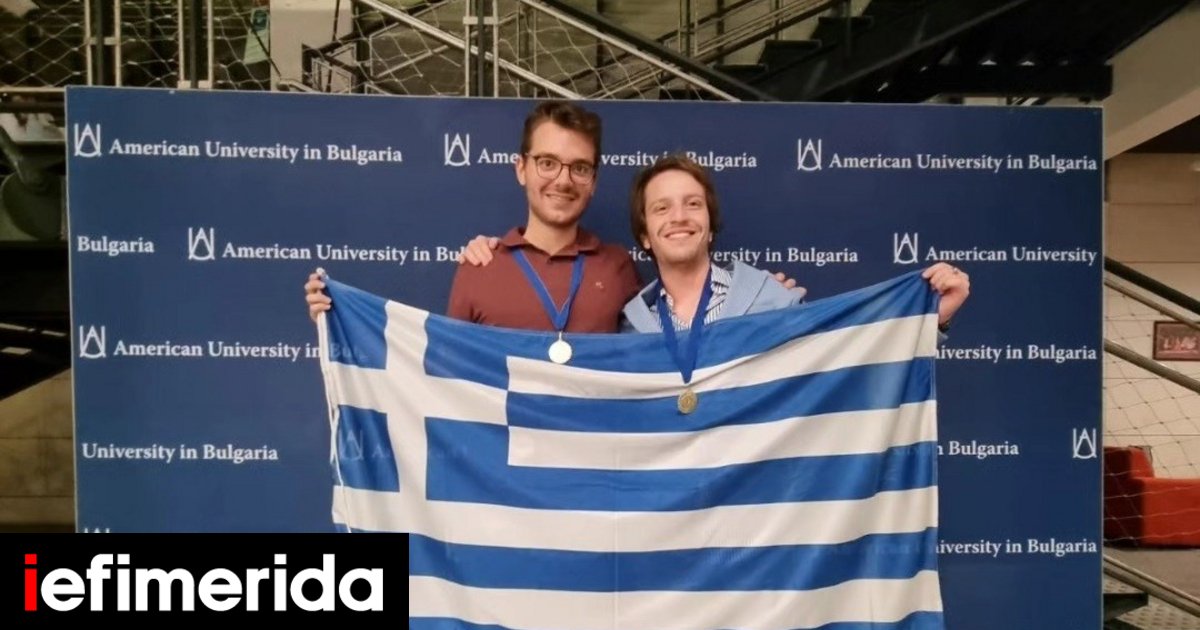
Another important distinction was recorded by the Department of Mathematics of the National University of Athens and Kapodistria in the most important international mathematics competition, which was held this year in Bulgaria about a month ago.
George Georgilis, 19, and Dimitris Emmanuel, 20, won gold medals against 393 students and 72 teams from 43 countries in the 30th edition of the competition. In particular, Dimitris, now in his third year, ranked 26th, and Giorgos, now in his second year, took 50-53rd place (equal rank with four people), recording one of the best performances for the Mathematics Department team.
“The competing students have to solve four problems in four hours, but it is very difficult. That is, one needs a lot of practice to reach this level. We probably had difficulty solving it ourselves,” says the department head and professor of the two students, Mr. Dimitris Heliotis, For APE-MBE. The professor explains that he begins with his colleagues “the process of preparing and selecting students, we give them directions, and then, of course, they work on their own.”
“The Holy Grail of Mathematics”: Whoever solves this mathematical problem will receive a million dollars
Tidglow made history by winning the only gold medal he had missed
In fact, the Mathematics Department at EKPA has created a useful way for students to collaborate and excel. “When we started in 2007, we were just teachers preparing kids. Over time, students created working groups. We organize the courses, but they are taught by students who have already competed, and are past winners. It’s a complete effort. “It’s a community between them,” explains Mr. Heliotis, who received a bronze medal in 1994, adding, for example, “Students who had similar privileges two years ago, chose not to go to the competition this year – because we encouraged them to do something more.” Ambitious with more activities – and so in the winter they taught these children who received gold medals.”
The International Student Mathematics Competition has been organized since 1994 by University College London and attended by leading universities in the United States, Europe and Asia. Students of the Mathematics Department at EKPA have been continuously involved from the 2007-2008 academic year until today, achieving great successes every year and establishing a science preschool as a reference point.
Even if the magic of mathematics seems far removed from the job market, it really isn’t. Mathematics finds very important applications in the fields of technology and innovation, and graduates of the department are in demand. As Mr. Heliotis states, a person who chooses mathematics as a field of study “can be employed as a researcher. The most important thing now is artificial intelligence, which is largely based on mathematics and partly computer science. Setting up this thing requires mathematics and especially statistics. Now statistics has applications beyond artificial intelligence in “Economics and medicine. That is, almost all areas of modern science use mathematics. We have even reached psychology to conduct studies and need statistics to draw conclusions.” In this context, and with this important difference up their sleeve, the future of Giorgos Georgili and Dimitris Emmanuel is expected to be bright. “They’re great,” their teacher says characteristically, commenting on how young they are.
George Georges and Dimitris Emmanuel: the golden duo
“You realize that your efforts are rewarded and that you have a tangible result from what you are doing. You see that all that accumulated experience pays off. It shows in the way of thinking and the feeling of satisfaction, this whole result,” says APE-MBE Giorgos Georgilis who, after studying in the first year of the EKPA , ranked 50-53. He has been involved in mathematics from a young age and participated in competitions as a teenager out of love. “We definitely have to give credit to my high school teacher, who motivated me and showed me the way. That’s how I started reading. But I think it was something I needed to find to channel my energy and creativity, because mathematics has that aspect. Along the way, I appreciated special techniques, let’s say philosophy Mathematics, structure and logical coherence,” explains 19-year-old George.
For 20-year-old Dimitris, this was his first gold medal. “The department helped a lot because it also teaches classes with older students who participated in previous years, as well as the professors who organize them,” he says. Dimitris’ father, a mathematician, introduced him to mathematics since elementary school and he loved it. “What I like now is research in mathematics. I want two more years to get a bachelor’s degree, I hope, and then maybe a master’s and a doctorate. Higher mathematics has a few applications, but it has applications in other fields. Let’s say, in physics and chemistry,” he says of his plans. Giorgos is “in an exploration phase” and, as he points out, “I’m trying to open my horizons and imagine what it would be like, for example, to work in finance. I’m working on different possibilities.”
Dimitris would say to a child who was lost in equations: “If he really loves mathematics, he will definitely find something to do. That is, even if he only wants to deal with theoretical mathematics and nothing else. There are ways, even if they seem difficult. Don’t give up.” “Despite the difficulties, there are people in all Greek schools who go the extra mile so that we can develop with the tools, with the supplies provided to us. Everywhere there are people who go beyond the standards and offer something more, both teachers and students,” concludes Giorgos.
Source: Al-Dakka – Al-Nahl

“Hipster-friendly coffee fanatic. Subtly charming bacon advocate. Friend of animals everywhere.”





More Stories
F-16 crashes in Ukraine – pilot dies due to his own error
Namibia plans to kill more than 700 wild animals to feed starving population
Endurance test for EU-Turkey relations and Ankara with Greece and Cyprus